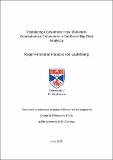Files in this item
Postulating consumers : how marketers conceptualise consumers in the era of big data analytics
Item metadata
| dc.contributor.advisor | Ball, Kirstie | |
| dc.contributor.author | von Laufenberg, Roger Ferdinand Francois | |
| dc.coverage.spatial | xiii, 229 p. | en_US |
| dc.date.accessioned | 2021-04-08T12:06:55Z | |
| dc.date.available | 2021-04-08T12:06:55Z | |
| dc.date.issued | 2021-07-02 | |
| dc.identifier.uri | https://hdl.handle.net/10023/22987 | |
| dc.description.abstract | The proliferation of big data analytics in marketing appears to be having significant effects on the field, such as changing how marketers perceive their consumers and how they act on them. As I discuss in my research, marketers are not satisfied to work solely with approximate, imagined conceptualisations of consumers as a basis for advertisements and offers. Instead, they are looking for exact virtual data doubles of existing and potential consumers, which is something they hope to achieve through big data analytics. In my thesis, I explore the question of how and why marketers conceptualise consumers differently when using big data analytics compared with traditional market and consumer research methods. This is embedded in the theory of the co-production of knowledge and empirically relies on interviews with marketers and data analysts, case studies, and participant observations at industry conferences. In my research, I show to what extent the idea of the data double consumer conceptualisation is considered an ideal case for marketers, and that it is believed to be made possible through big data analytics, which is expected to create an exact knowledge about consumers. However, my findings show that in practice, big data analytics should be considered a sociotechnical assemblage that produces knowledge which contains inaccuracies, errors and uncertainties. Knowledge about consumers is not just discovered – neither through traditional market and consumer research methods nor through big data analytics. Instead, it is the outcome of a co-production that involves different steps, individuals, teams, normativities, and technologies. Hence, knowledge about consumers is never an exact representation of reality, irrespective of its methods of production. Consequently, consumer conceptualisations expected to be exact data doubles cannot be attained. Instead, postulations are established that are believed to be accurate, without having actual proof. Yet, my findings show that knowledge resulting from big data analytics has a higher credibility and epistemic authority amongst the participants, explaining the persistence of the data double consumer conceptualisation in digital marketing. | en_US |
| dc.description.sponsorship | "This work was supported by the Social Sciences and Humanities Research Council of Canada through the Big Data Surveillance Project and the University of St Andrews." -- Funding | en |
| dc.language.iso | en | en_US |
| dc.publisher | University of St Andrews | |
| dc.relation | Postulating consumers: how marketers conceptualise consumers in the era of big data analytics (thesis data) Von Laufenberg, R.F.F., University of St Andrews, 2021. DOI: https://doi.org/10.17630/af965a99-1c23-4a3d-a49d-f2b54529fcca | en |
| dc.relation.uri | https://doi.org/10.17630/af965a99-1c23-4a3d-a49d-f2b54529fcca | |
| dc.rights | Creative Commons Attribution-NonCommercial-NoDerivatives 4.0 International | * |
| dc.rights.uri | http://creativecommons.org/licenses/by-nc-nd/4.0/ | * |
| dc.subject | Organisational sociology | en_US |
| dc.subject | Digital marketing | en_US |
| dc.subject | Big data analytics | en_US |
| dc.subject | Epistemic authority | en_US |
| dc.subject | Co-production of knowledge | en_US |
| dc.subject | Critical marketing | en_US |
| dc.subject | Actor-network theory | en_US |
| dc.subject | Surveillance studies | en_US |
| dc.subject.lcc | HF5415.L2 | |
| dc.subject.lcsh | Marketing | en |
| dc.subject.lcsh | Marketing--Data processing | en |
| dc.subject.lcsh | Big data | eng |
| dc.title | Postulating consumers : how marketers conceptualise consumers in the era of big data analytics | en_US |
| dc.type | Thesis | en_US |
| dc.contributor.sponsor | Social Sciences and Humanities Research Council of Canada (SSHRC) | en_US |
| dc.type.qualificationlevel | Doctoral | en_US |
| dc.type.qualificationname | PhD Doctor of Philosophy | en_US |
| dc.publisher.institution | The University of St Andrews | en_US |
| dc.identifier.doi | https://doi.org/10.17630/sta/58 | |
| dc.identifier.grantnumber | 895-2015-1003 | en_US |
The following licence files are associated with this item:
This item appears in the following Collection(s)
Except where otherwise noted within the work, this item's licence for re-use is described as Creative Commons Attribution-NonCommercial-NoDerivatives 4.0 International
Items in the St Andrews Research Repository are protected by copyright, with all rights reserved, unless otherwise indicated.


